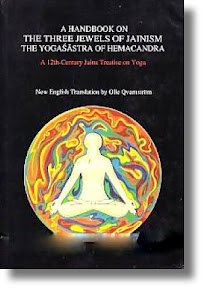A Handbook on the Three Jewels of Jainism
Hemacandra:
A Handbook on the Three Jewels of Jainism : the Yogaśāstra of Hemacandra / translated by Olle Qvarnström. - Rev. and expanded ed. - Mumbai : Hindi Granth Karyalay, 2012. - 361 S. - (Pandit Nathuram Premi research series ; 29)
ISBN 978-81-88769-40-7
Rs. 700,00
US$ 36,75 (D.K. Agencies)
US$ 48,60 (Bagchee)
DDC: 181.044
Beschreibung
The Yogashastra is a Sanskrit work with 12 chapters (prakasha). It occupies a very important place in the Shvetambara Jain tradition. In twelve chapters, this work sheds light on various aspects of religion and morality, promoting the timeless Jain ideals of non-violence, self-control and penance. Hemacandra emphasises ascetic practices for moral upliftment, service to one's parents, meditation for spiritual progress, recitation of the Jinas' names, and the importance of the meritorious conduct of non-violence, truthfulness, non-stealing, celibacy and non-possessiveness. The Yogashastra is therefore a complete text, addressing both the ascetic and the layperson, and guiding them both on the path of liberation.
Acarya Hemacandra is possibly the most high profile and certainly the most prolific Jain monk in the Shvetambara denomination of the Jain Church. He was amongst the most profound scholars of his era, a polyglot, and known as "Kalikala-Sarvajna". This work is unique as not only was the original text written by Hemacandra, but also he composed a Sanskrit commentary.
This work has been published in an aesthetically pleasing manner, in the A4 size, with a very attractive dust jacket. It has been translated into English by the renowned scholar and Indologist Prof Dr Olle Qvarnström of Sweden. His translation is based on Muni Jambuvijaya’s critical edition. The text comprises of 1009 verses divided into 12 chapters. A majority of the verses are composed in the shloka metre. However, several verses in the last two chapters are composed in the arya metre.
The book was first published by Harvard Oriental Series, Volume 60. Harvard University has kindly permitted us to publish this revised and expanded edition. We have also added the original text in Devanagari in this edition.
This edition, which is dedicated to Prof Padmanabh S Jaini of Berkeley University for his impeccable scholarship and excellent mentorship of those who pursue Jain studies, includes Sanskrit text in Devanagari and Sanskrit text in roman with diacritics and English translation. [Here now 4u]
Die Erstausgabe erschien unter dem Titel: The Yogaśāstra of Hemacandra : a twelfth century handbook on Śvetāmbara Jainism / transl. by Olle Quarnström. - Cambridge, Mass. [u.a.] : Department of Sanskrit and Indian studies, Harvard University, 2002. - v, 230 S. - (Harvard Oriental Series ; 60). - ISBN 0-674-00934-7
Inhalt
INTRODUCTION
Hemacandra
The Yogaśāstra
Editions
SYNOPSIS
TEXT AND TRANSLATION
Homage to Mahāvīra
Yoga or the three Jewels
The Proper Conduct of a Mendicant
The Proper Conduct of a Layman
The Self as the Identity of the three Jewels
The Four Passion
The Five Senses
Purity of Mind
Equanimity
The Twelve themes of Contemplation
Equanimity & Meditation
Yogic Postures
Breath Control
Critique of Breath Control
The Withdrawal of the Sense from their Objects
Concentration
Virtuous and Pure Meditation
Reality according to Hemacandra
Übersetzer
OLLE QVARNSTRÖM, professor Centrum för Teologi och Religionsvetenskap, Lunds universitet. Profile page.
Quellen: JainNet @ Yahoo Groups, Mitteilung vom 30. Aug. 2012; Roz Ek Sher @ Google Groups, Mitteilung vom 31. Juli 2012; WorldCat; Here now 4u; D.K. Agencies; Bagchee
Bildquelle: Hindi Granth Karyalay
Bibliographie: [1]
References
Ähnlich
- Jain Philosophy 2
- Perspektivismus und Kritik
- Franco/Notake: Dharmakīrti on the Duality of the Object
- Moriyama: Omniscience and Religious Authority
- Sthiramati's Pañcaskandhakavibhāṣā
- Park: Vasubandhu, Śrīlāta, and the Sautrāntika Theory of Seeds
- Eltschinger: Buddhist Epistemology as Apologetics
- Carpenter: Indian Buddhist Philosophy
- The Foundation for Yoga Practitioners
- Companion to Buddhist Philosophy

